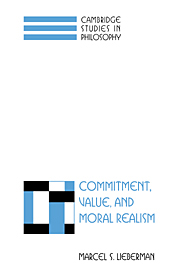3 - Commitment and intention
Published online by Cambridge University Press: 02 December 2009
Summary
INTRODUCTION
The previous chapter opened up the debate over commitment and its relation to moral realism, and helped bring into focus some of the main points of contention, most notably the role of beliefs in commitment and the restrictions on their content. By way of addressing these issues and isolating the central points for analysis, I want to draw out and extend as much as possible a comparison between commitment and intention, since precisely the same problems have been raised with respect to intention as will be addressed concerning commitment. As we shall see, there are a considerable number of overlaps between the two.
As I have noted, the term “commitment” is used in a variety of contexts with a variety of meanings. Among moral and political philosophers one finds references to the importance commitment plays in structuring our lives and reinforcing the basic good of self-esteem. For virtue ethicists commitment serves as a crucial basis for integrity. Sociologists have taken an interest in commitment as a way of examining consistent patterns of behavior in individuals. Organizational psychologists use it as an indicator of productivity and pro-social behavior. And action theorists have seized on the term to explain a complex sort of intention. Thus a first task of this present chapter will be to defend the position that these different commitments, from which the general description of commitment was derived, have more in common than their nominal similarities in order to ward off objections that the analysis of commitment I offer has been caught in a pun on its various uses.
- Type
- Chapter
- Information
- Commitment, Value, and Moral Realism , pp. 57 - 87Publisher: Cambridge University PressPrint publication year: 1998



